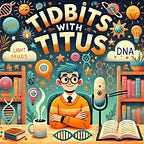Hello my friends!
Welcome to Tidbits with Titus, a podcast and newsletter where we tackle the big, curious questions kids ask every day in fun, bite-sized ways! I’m Alexander Titus, but I go by Titus. I’m a scientist, adventurer, and a huge fan of making science, technology, and life accessible to all ages. From “How does electricity work?” to “What are taxes?” and even “Why is the sky blue?”, I’m here to dive into these wonder-filled questions with engaging stories and simple explanations that spark curiosity and make learning a joy. This effort is all about creating a space where families can learn together, discover the magic of the everyday, and find thoughtful ways to explore the world’s big mysteries. Let’s make curiosity a family tradition—one tidbit at a time!
Just so you know, these podcast episodes are all AI-generated using Google’s really cool NotebookLM technology.
If your little ones have questions that you want help answering, shoot me an email at questions@tidbitswithtitus.com and I’ll see what I can do!
Also please share with anyone you think would be interested. The more the merrier!
Cheers,
-Titus
A story abouWhy Can I Learn Faster Than You, Dad?
Sophie was flipping through her new Spanish workbook at the kitchen table. She had learned a few phrases in class that day, like hola for hello and gracias for thank you. Her dad sat beside her, holding his phone with a confused look as he tried to pronounce como estes.
“Dad,” Sophie said, giggling, “it’s co-mo es-tes! You’re saying it all wrong.”
Her dad smiled sheepishly. “Well, smarty-pants, it’s not as easy for me as it is for you. You pick this up so fast!”
Sophie tilted her head. “Why is it easier for me, Dad? You’re older—you should be better at everything.”
Her dad chuckled. “Good question, Soph. Let me explain. You see, your brain is like a big sponge right now. It can soak up new things—like Spanish—really easily. My brain is more like… a full backpack. It takes more effort to stuff new things in there.”
Sophie frowned. “So, does that mean grown-ups can’t learn new things?”
“Not at all!” her dad said. “It just means we have to work a little harder at it. When you’re a kid, your brain is growing and building all kinds of connections. It’s like a construction site, ready to make new roads wherever you need them. But my brain has already built most of its roads, so adding new ones takes more time.”
Sophie thought about that for a moment. “Oh, so my brain is like a new city, and yours is like an old city with lots of buildings already?”
“Exactly!” her dad said. “And here’s another thing: you’re not afraid to try new sounds, even if you get them wrong. Grown-ups sometimes worry about making mistakes, so we don’t practice as much.”
Sophie grinned. “I don’t care if I mess up. It’s kind of funny when I do.”
Her dad laughed. “That’s the spirit! And because you’re practicing all the time—at school, with your friends, and now with me—you’re getting better every day. I might need more time to catch up!”
Sophie picked up her workbook and pointed to a new phrase. “Okay, let’s practice together. How do you say ‘good night’ in Spanish?”
Her dad squinted at the page. “Um… bwen…os noches?”
Sophie burst out laughing. “No, Dad! It’s bue-nos no-ches! Come on, let’s say it five times together.”
As they repeated the phrase, Sophie couldn’t help but feel proud. Not only was she learning a new language, but she was helping her dad learn too. “Don’t worry, Dad,” she said. “You might have an old-city brain, but I think you’re still pretty good at learning.”
Her dad smiled. “Thanks, Soph. And with you as my teacher, I might just be fluent someday.”
Sophie beamed. “You will be! But until then, I’ll make sure to giggle when you mess up.”
This week on Tidbits with Titus: Why is it easier for kids to learn new languages than adults? Dive into the science of growing brains, curious learners, and how a little practice can go a long way—no matter your age!t learning languages












